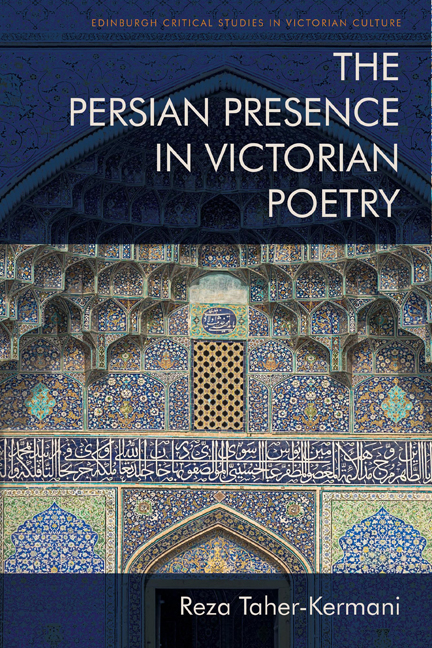Book contents
Epilogue: The Persian Presence in Victorian Poetry
Published online by Cambridge University Press: 05 March 2024
Summary
This book has aimed to reveal something of the richness and variety in the treatment of Persia in Victorian poetry. The images and associations that Persia evoked in the cultural imaginary of nineteenth-century Britain certainly do not lend themselves to easy classification. To the Victorians, Persia was at once the enemy of the Greeks, the saviour of the Jews, the realm of legendary kings such as Cyrus, the throne of feeble monarchs like Ahasuerus, the battleground of extraordinary young men like Sohrab, the rose garden of wine-drinking lyricists such as Omar Khayyám, and the land of mystic dervishes like Ferishtah. But while the Victorians layered a multitude of meanings on Persia, they were reluctant to perceive it in its contemporary state. It was as though they had decided not to engage with the actual Persia, that they had conspired to portray Persia only in the context of the past – a past, moreover, in which history played a less important part than myth. Looking back at the numerous examples in Chapter 2, and at the case-studies of Arnold, FitzGerald, and Browning, we see that the Persia in all of these works figures as fictional, fabled, ancient, and far from its modern state. Even poems which purport to reflect contemporary Persia, such as Thomas Moore's ‘Letter VI, from Abdallah, in London, to Mohassan, in Ispahan’, which was included in Intercepted Letters; or, the Twopenny Post-Bag (1813), often turn out to be fanciful or deliberately distorted, since Persia in such poems is a means, not an end in itself.
It may be argued, though, that the disconnection between historical reality and poetic representation is not exclusive to Persia and its image in English poetry of the nineteenth century, that there is an inherent discord between socio-historical actualities and poetics in the period, as F. R. Leavis claimed: ‘Nineteenth-century poetry, we realize, was characteristically preoccupied with the creation of a dream-world.’ Yet even if this judgement were accepted as generally valid, it would apply with special force to the representation of Persia, in which the divide between ‘fancy’ and ‘fact’ (to borrow Browning's terms) is both comprehensive and consistently maintained by writers who differ from each other in almost every other respect.
- Type
- Chapter
- Information
- The Persian Presence in Victorian Poetry , pp. 204 - 206Publisher: Edinburgh University PressPrint publication year: 2020



